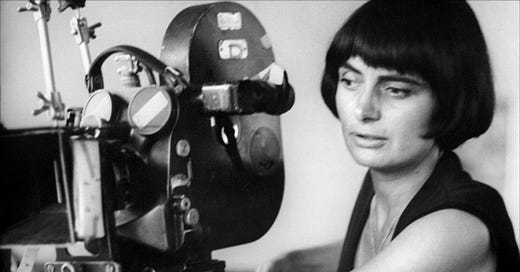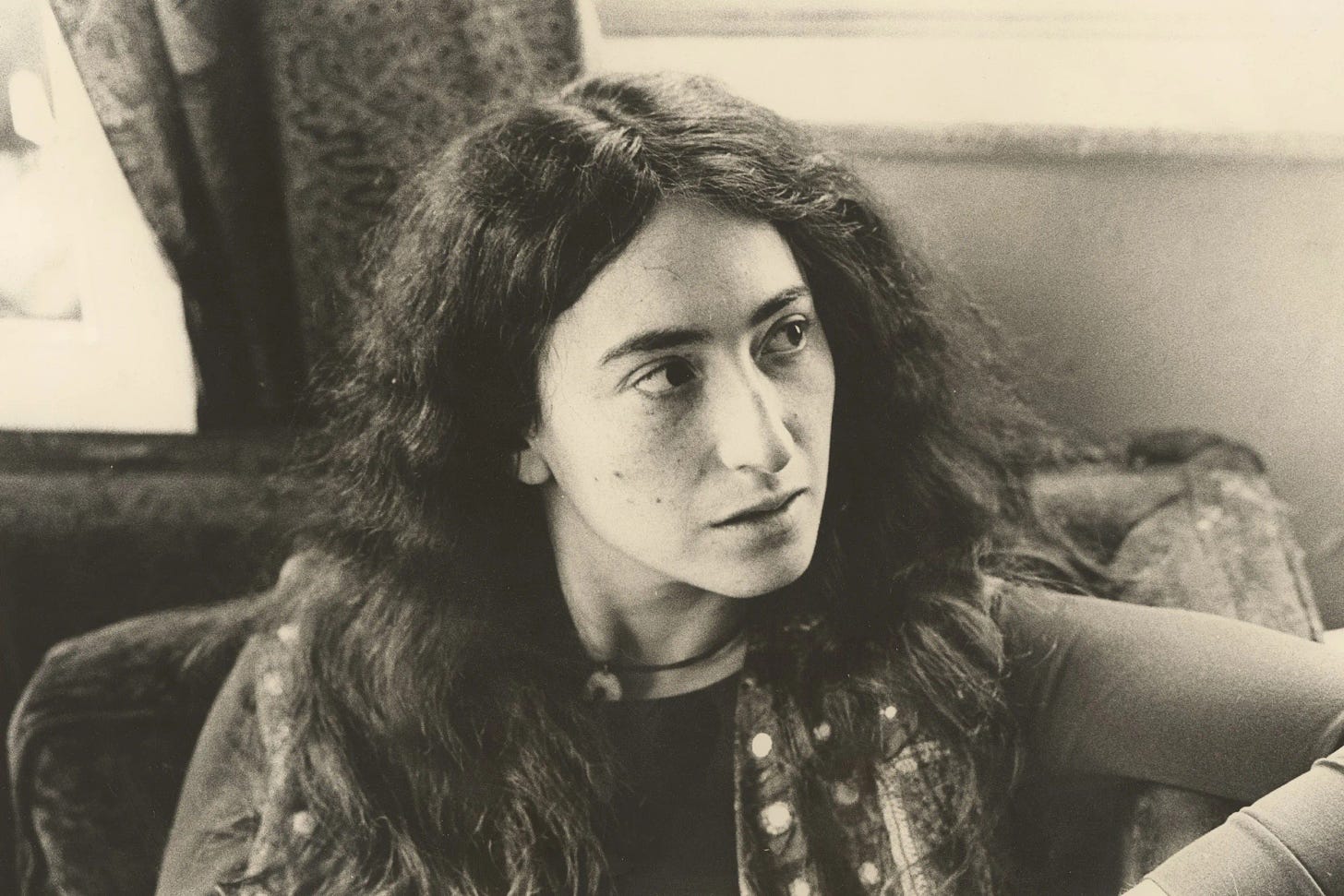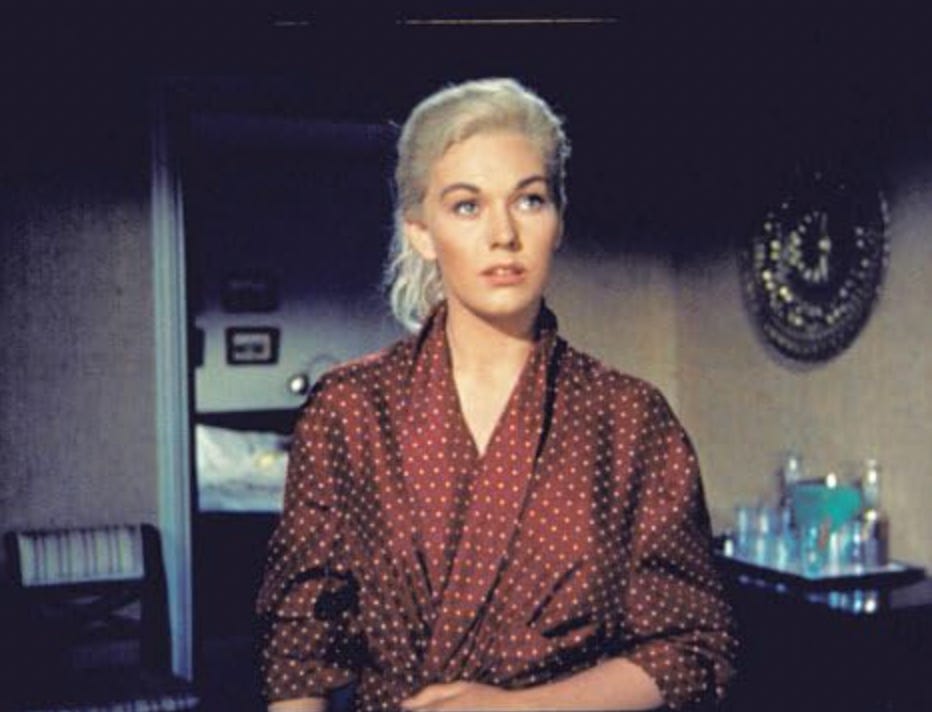Last night we watched One Sings, the Other Doesn’t, a film by Agnès Varda that’s a love letter to female friendship. The movie was released in 1977, and I remember its enchantment at the time. I was 31 and had been in the women’s movement for ten years, which was about as old as the movement was in the US. The women in One Sings have children at different stages, and men float in and out of their hearts, but it’s the bond between them, sewn together piece by piece, that gives them their lives.
Varga loves her cast, Valérie Mairesse as Pomme, and Thérèse Liotard as Suzanne. The women first come together as girls on the brink of adult life, and the world they shape is some kind of hippie commune dream, combined with abortion rights activism, caravan street theater, and the romance of foreign travel.
The bond between the women absorbs Varga’s attention. Men are not interested in this bond. You never see it in their films. Take Klute (1971), for example, directed by Alan Pakula. Pakula is attracted to Jane Fonda’s sad, sex worker character, but Jane as Bree Daniels doesn’t have female friends. She moves around the board from one man to another.
The women’s movement didn’t rise up from a bonding that was already there. The women’s movement set in motion the possibility of this bonding as a lifeline, and if you were a woman looking for a way to break ranks with the past, if you had entered the women’s movement because it was the only door you could pass through, then you fell in love with female friendship. You fell in love with it even if, like me, you weren’t especially good at sustaining relationships. The Vargas movie snaps all this back into focus, this time of choosing the only language you could speak.
Last night, when I streamed One Sings, I was also reading 1974, a memoir by Francine Prose that centers on the Vietnam War—the other half of the period’s brain that many of us lived in. Prose writes about a time she was a fast train switching tracks. She’s 26, and her first novel has been published. She’s left Cambridge, where she’s been in graduate school, and she’s left a marriage. The marriage and school are pinballs stuck in holes, and to pop herself out, she goes to San Francisco, where she meets Tony Russo, who, with Daniel Ellsberg, three years earlier, had Xeroxed 7000 pages of secret government documents and released them to the press as The Pentagon Papers. The Pentagon Papers, which the New York Times began publishing on June 13, 1971, contained the truth of the government's covert and illegal operations all over the world—lies the executive branch told Congress in order to wage war in Vietnam.
Tony drives Francine around San Francisco late at night at scary speeds in a car with a rusted hole in the floor. As he drives, he delivers a monologue about his experiences, hoping in a way that’s not quite stated she’ll scoop up the stories and show him how they can be a book.
Francine falls in love with this front seat in history and with the courage Tony has shown in trying to end the war. Nothing she or any of the rest of us who care about the crazy, senseless killing of Vietnamese people and the deaths of poor-schmuck soldiers, nothing any of us will do will come close to Tony’s act of courage, which is also an act of atonement, since he and Ellsberg leaked data they had helped gather when they worked for the RAND corproration, a private research organization hired by the government to justify its military goals.
What Prose captures brilliantly is the feeling of life in the early 1970s if you were young and thought you could remake the world. Every generation of young people wants to remake the world, right? Not quite. There was a collective bubble of belief we lived in, where you could breathe and where of course you couldn't altogether breathe because air was not evenly distributed, even in the bubble. The thing about the bubble is it left you in a permanent state of understanding and lack of understanding that ordinary, passive, acquiescence to whatever power is calling the shots is both shockingly reliable and dumbfoundingly unfathomable.
Prose doesn't care if you learn about her personally. That’s not why she wrote the book. Yet by looking back and wondering what she was up to in the past and wondering now, as she writes, we see how reflection works and how narrative builds into a piece of music from searching reflections. 1974 is about being young and wanting to attach your gorgeous, creative animal self to the grand, romantic project of social transformation. We all wanted to do that. When I say “all,” I mean everyone I knew, and if you were a girl, you didn’t know how to sort the romance of I need to fuck people (so I can discover how life works) from the romance of I am part of a generation that is going to get this done, this end to official lies. You didn't need to sort out the two impulses. It was all sex and all please make life better for more people.
Varda’s film captures the sun of this backward glance. She was pretty much the only girl at the French New Wave boys’ table, ringed with Louis Malle, Claude Chabrol, François Truffaut, Alain Resnais, and Jean-Luc Godard. In One Sings, she adopts the “authorial” voiceover, connecting us to the sweep of the women’s lives between dramatic scenes. It’s so like Truffaut’s voiceovers, with a narrator telling a story as the camera, mounted on a car, rushes along roads and past other vistas. Varda’s narrator in this film is herself, and she cast her own children as Suzanne's son and daughter. The events of the film echo her life.
In part, it’s the sun of this vision that makes it seem a little dated. It can’t see the gathered gloom that Prose feels surrounding her, as it would have to, writing about the US in Vietnam. Sorrow rises off the pages of 1974, sorrow that the findings of The Pentagon Papers and several years later of the Watergate scandal did nothing, really, to change government policy going forward. Nor did the revelations arouse the public to free themselves at last from governments that lie on behalf of profiteers.
Watching One Sings and reading Prose, I found myself thinking about what makes a work from the past, created in a headset of its time and mainly by male humans, what makes a film still alive as you watch it, and what makes a rendering of a period’s mood feel true and open-ended? For me, it comes down to two tests. Not really. It could be based on a lot of other factors, but to hell with them. Let’s entertain my idea of these two tests.
The first is the Bob Dylan song test. Is the female character in a relationship that is basically a Bob Dylan song? Where the girl arouses a set of needs or emotions in the singer—it could be sexual interest or scorn—but we know nothing about the girl because the singer isn’t interested in her. He’s interested in her interest in him and what she makes him feel. Does the movie or book do this without noticing or caring? For me, if this is happening, I’m done. Goodbye. I’m not saying remove anything from circulation. I’m saying, I’m bored and I got no more time for this.
The other test is the Vertigo test, which is similar to the Bob Dylan song test. In both cases, a female character is entirely instrumental to the feeling states of the male character or of the film’s auteur. These days, when people praise Hitchcock’s Vertigo, released in 1958, they have to reinvent the movie, so in their minds it’s all about obsession, or post-war trauma, or how when you fall in love you want to mold the other person into something you can get off with in bed. It’s no longer a film in which Scotty, played by James Stuart, and Judy, played by Kim Novak, have this conversation:
Judy: Couldn't you like me, just me the way I am? When we first started out, it was so good; w-we had fun. And... and then you started in on the clothes. Well, I'll wear the darn clothes if you want me to, if, if you'll just, just like me.
Scottie: The color of your hair...
Judy: Oh, no!
Scottie: Judy, please, it can't matter to you.
When you hear a man say to a woman your hair color can’t matter to you, you will no doubt burst out laughing, but what kind of laughter is it, and who are you laughing at?
I think old movies and old books continue to sing if they are some kind of love letter to a person or an experience that brings the loved object to life in accumulated detail. We see it, smell it, taste it, and sometimes remember it. We remember it even if we didn’t live it. We have never lived any of it.
Why does Truffault’s film Day for Night cast the same spell now as it did when it was released, in 1973? Because the movie wants to show you, in a happy and excited way, how an art family forms when people come together to make a film, and it wants you to see, as well, the beautiful vanishing of this family when the players sail off and the sets are struck. Why can Humphrey Bogart still seduce us in The Maltese Falcon (1941)? Because in every scene he makes love to whatever woman he’s talking to, as well as to the great male actors, among them Peter Lorre and Sydney Greenstreet, who will reappear in Casablanca (1943).
As charming as Bogart remains in this movie, too, with his hard-boiled quips—“I remember every detail, the German wore gray, you wore Blue”—Casablanca fails the Bob Dylan song test, because Ilsa, Bogart’s love interest, is passed around from man to man without getting a say about it. The film works as a love story between Bogart’s character Rick and the corrupt chief of police, played by Claude Raines. Ingrid Bergman, who was cast as Ilsa, thought the character was ridiculous and could never understand the big deal people made of her.
Try these tests and see if they work for you. Why does Rosemary’s Baby (1968) still delight? Because as the conniving husband, John Cassavetes combines the solipsism of the New York actor with the ordinary inobservance of the coddled husband to produce a man who believably pimps his wife to the devil for better acting parts. Roman Polanski makes a gothic horror film out of ordinary bourgeois marriage.
Looking back at One Sings and at the spirit of the times conjured in 1974, we’re called back to a sense of hope, however fragile it sometimes felt, that wafted over an entire generation. I think of it as an entire generation. The air contains more than the word “idealism” conveys. That the things revealed in The Pentagon Papers and in the Watergate inquiry could happen had, alas, the opposite effect of what was hoped for: they wound up undermining belief there could be any truth in government.
There’s no fathoming this stepping back from disclosures of deceit for profit and from expressions of hatred for people who are not you. There’s no fathoming the colossal stain of Trump. To me, part of the pain of our moment is its unfathomable nature, and I truly loathe those smug, hands-in-pockets and oily-smile theories of how it all happened, how we traveled from somewhere else to here and who is to blame. You do not know, those of you who claim to know. You probably don’t even really believe you know.










Hello dear readers of Oldster. It's a deep pleasure writing in this environment and in collaboration with Sari Botton. I want to let you know lead Zoom conversations on the content of the posts and on writing craft once a month for paid subscribers at any level. I will be talking about today's post about Agnes Varda and Francine Prose at the next Zoom conversation on July 27 from 3 to 4pm EST. People who sign up are also invited to send ahead questions about their own writing projects. For more information and to sign up, please email me at: lauriestone@substack.com.
Thank you for this thoughtful, clear and provocative piece that manages to capture the desperation we feel now by looking back at older works. It makes me sad, this piece, and it makes me want to watch One Sings again.